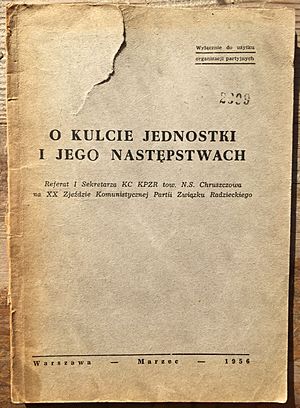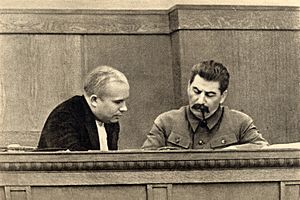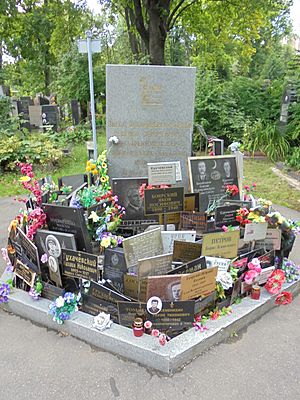Khrushchev's Secret Speech facts for kids
The Secret Speech was a very important report given by Soviet leader Nikita Khrushchev on February 25, 1956. He gave this speech to a special meeting of the Communist Party of the Soviet Union. In his speech, Khrushchev strongly criticized the actions of Joseph Stalin, who had led the Soviet Union for many years.
This speech was a big moment because it was the first time a Soviet leader openly spoke against Stalin's rule. It aimed to bring the Communist Party back to the ideas of Leninism, which were the original principles of the party. Khrushchev said that Stalin had broken these important rules.
It was called the "Secret Speech" because it was given in a closed meeting. Only party members were there, and no reporters or guests were allowed. Even though the speech was secret, copies of it quickly spread outside the Soviet Union. However, the official Russian text was not published until 1989, during a time of greater openness called glasnost.
How the Speech Became Public
In April 1956, photographs of the speech document reached the CIA, a US intelligence agency. They quickly told Dwight D. Eisenhower, who was the President of the United States. After checking that the speech was real, the CIA shared it with The New York Times newspaper in early June 1956. This made the speech known to the whole world.
Why the Speech Was So Important
The Secret Speech was a major turning point in history. It was based on a study of how many people were wrongly punished during Stalin's time. This study looked at the delegates from a Communist Party meeting in 1934. Many of these people became victims of Stalin's "purges" in the 1930s.
A special group found that during 1937 and 1938, a time known as the Great Purge, over 1.5 million Party members were accused of "anti-Soviet activities." More than 680,000 of them lost their lives. These numbers came from lists signed by Stalin himself. The actual number of people who died during the Great Purge was even higher.
Impact of the Speech
The speech completely changed how people viewed Stalin's role in history. Many people in Western countries who had supported the Communist Party or Stalin decided to leave the party. They no longer defended Stalin's actions.
The speech was so shocking that some people in the audience reportedly had heart attacks. Many Soviet citizens were also very confused. They had always been taught to praise Stalin as a "genius." In Georgia, Stalin's home country, there were even riots. The Soviet Red Army had to step in to stop them on March 9, 1956.
Even though the speech condemned the unfair punishments, it took time for people who were wrongly accused to be officially cleared. However, political prisoners started to be released from labor camps soon after Stalin's death. The victims of the Moscow Trials, which were unfair show trials, were finally cleared of all charges in 1988.
See also
 In Spanish: Acerca del culto a la personalidad y sus consecuencias para niños
In Spanish: Acerca del culto a la personalidad y sus consecuencias para niños
 | William Lucy |
 | Charles Hayes |
 | Cleveland Robinson |




